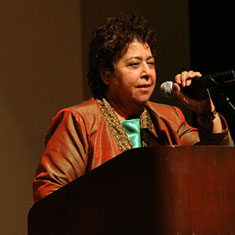-
Taliban Return Threatens Gains in Girls’ Education, Says Razia Jan
August 23, 2013 By Jacob Glass
“There has never been a school for girls in this area; no one really offered them this option,” says Razia Jan in this week’s podcast. “Whenever I see these girls and I talk to my students, I can’t tell you how honored I am that my girls are getting educations.”
Since 2008, Jan has managed the Zabuli Education Center, an all-girls school located in Afghanistan’s Deh’Subz district. With the support of her organization, Razia’s Ray of Hope Foundation, the school provides free kindergarten-through-ninth-grade education to 400 Afghan girls.
“There has never been a school for girls in this area; no one really offered them this option,” says Razia Jan in this week’s podcast. “Whenever I see these girls and I talk to my students, I can’t tell you how honored I am that my girls are getting educations.”
Since 2008, Jan has managed the Zabuli Education Center, an all-girls school located in Afghanistan’s Deh’Subz district. With the support of her organization, Razia’s Ray of Hope Foundation, the school provides free kindergarten-through-ninth-grade education to 400 Afghan girls.
The Zabuli Center is contributing to a wave of education initiatives that are putting more Afghan women and girls in school – up to seven million currently, Jan says – than ever before. In a country with one of the highest maternal mortality rates in the world, she believes education can empower young women to live healthier and more productive lives.
“Education is the only way that we can change this,” she says. “In my school, there are girls that are engaged and have asked their parents, ‘Please wait until I do my 12th grade before I get married.’ When they graduate they will be 23 years old, and that is the right age for [them] to get married, instead of 11 and 12.”
However, noting recent U.S. negotiations with the Taliban, Jan warned that allowing the conservative and violent group to return to legitimacy could threaten these and other gains by women and girls.
“I know these people will never do what they say,” she says. “If there is any chance for the women, for girls to get educated, you have to think 10 times before you negotiate with these murderers. They put acid on girls, cut their throats, cut their noses for just going to school.”
“Now we are breathing, and we can’t afford any kind of disturbance among these kids. They are very scared…let’s make sure that they continue to go forward and make a life for themselves.”
Jan spoke via webcast from Afghanistan at the Wilson Center on June 24.
Friday Podcasts are also available for download from iTunes.
Photo Credit: Razia Jan, courtesy of Razia’s Ray of Hope.
Topics: Afghanistan, Asia, conflict, development, education, family planning, Friday Podcasts, gender, global health, podcast, population, U.S., youth
 A Publication of the Stimson Center.
A Publication of the Stimson Center.



